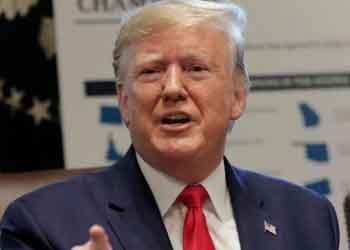The President Donald Trump’s administration has imposed sweeping sanctions on six Indian companies and several other foreign entities engaged in the trade of Iranian petroleum and petrochemical products. The move is part of a broader crackdown aimed at curbing Iran’s revenue streams that fund terrorism and fuel conflict in the Middle East.
U.S. Sanctions Target India-Based Firms Over Iran Ties
The U.S. State Department on Wednesday declared a sanctions package targeting 20 international companies, with six hailing from India. These Indian firms were found to have knowingly conducted significant transactions involving Iranian-origin petrochemicals, violating U.S. sanctions laws and policies.
The targeted companies include:
Kanchan Polymers
Alchemical Solutions
Ramniklal S Gosalia & Co
Jupiter Dye Chem Private Limited
Global Industrial Chemicals Limited
Persistent Petrochem Private Limited
These firms have allegedly facilitated millions of dollars’ worth of trade with Iran through intermediaries based in the UAE and other countries, raising concerns in Washington over the persistent circumvention of sanctions.
Breakdown of Each Indian Company’s Activities
Kanchan Polymers
This company reportedly imported Iranian-origin polyethylene and other petrochemical materials worth over $1.3 million between February and July 2024. The purchases were made through Tanais Trading, a UAE-based intermediary company suspected of operating as a front for Iranian suppliers.
Alchemical Solutions
Alchemical Solutions was found to have procured petrochemical products valued at more than $84 million during the 12-month period between January and December 2024. The volume and frequency of transactions underscore a consistent commercial relationship with Iranian-linked entities.
Ramniklal S Gosalia & Co
The firm was involved in transactions exceeding $22 million for Iranian methanol and toluene imports from multiple companies between January 2024 and January 2025. These transactions form part of a broader network aiming to quietly distribute Iranian chemical goods in international markets.
Jupiter Dye Chem Private Limited
With over $49 million in transactions linked to Iranian-origin petrochemicals—especially toluene—Jupiter Dye Chem has now been blacklisted for operations conducted between January 2024 and January 2025. The U.S. has accused the firm of deliberately engaging in activities that support Iran’s shadow petrochemical industry.
Global Industrial Chemicals Limited
This entity handled over $51 million worth of transactions tied to Iranian suppliers in 2024. The company has been labeled a critical enabler of Iran’s petrochemical export apparatus and now faces severe restrictions under U.S. jurisdiction.
Persistent Petrochem Private Limited
With an alleged business volume of $14 million with Iran-affiliated companies, Persistent Petrochem is accused of facilitating sales and transportation of petrochemical goods that directly bolster Tehran’s economic resilience under sanctions.
Consequences: Asset Freezes and Global Trade Implications
The State Department clarified that all property and interests in property of the sanctioned companies that fall under U.S. jurisdiction will now be blocked. Additionally, U.S. persons and businesses are prohibited from engaging in transactions with these entities, and secondary sanctions may be imposed on foreign institutions that knowingly facilitate these companies’ operations.
This action sends a sharp message to international businesses: trading with Iran carries substantial risks, especially under the Trump administration’s maximum pressure campaign.
Statement from the U.S. State Department
According to the statement released, the Iranian regime continues to generate billions in revenue through illicit oil and petrochemical exports, which it allegedly channels into terrorist groups, regional militias, and internal repression. The State Department stated:
“We are targeting individuals and firms that help Iran conceal the origin of its oil and petrochemical products. These deceptive practices fund violence and destabilization.”
President Trump has also warned international players: any country or company purchasing Iranian oil or petrochemicals will be subject to U.S. sanctions and will jeopardize their access to the American financial system.
Wider Crackdown: Entities Linked to Iran’s Supreme Leader Also Sanctioned
In a simultaneous move, the U.S. Department of the Treasury imposed sanctions on 50 individuals and organizations tied to Mohammad Hussain Shamkhani, the son of Ali Shamkhani, a senior political adviser to Iran’s Supreme Leader Ayatollah Ali Khamenei.
Described as the largest sanctions action on Iran since 2018, this round targets an expansive network of shipping, finance, and front companies used to mask the origins and destinations of Iranian petroleum shipments.
Indian National in UAE Also Under U.S. Sanctions
Among those targeted is Pankaj Nagjibhai Patel, an Indian citizen operating out of the United Arab Emirates. Patel reportedly served as an executive in several shipping firms facilitating Iran’s oil transport, including the UAE-based Teodor Shipping.
According to the Treasury, Teodor Shipping received millions of dollars to operate and manage vessels that exported Iranian petroleum. Patel’s involvement places further pressure on India-UAE trade corridors and raises questions about oversight in transnational shipping operations.
The Bigger Picture: Why This Matters
The U.S. crackdown on Indian firms reflects Washington’s zero-tolerance policy for nations and entities that defy restrictions on Iran. With India’s increasing involvement in global energy markets, these sanctions could potentially:
Disrupt supply chains
Affect diplomatic relations
Force Indian companies to reevaluate international procurement strategies
Moreover, by going after executives and vessels linked to Iran’s extended oil network, the U.S. is signaling that no level of indirect participation will be spared.
Potential Diplomatic Fallout
India’s foreign ministry has yet to issue a formal response. However, analysts believe that this move could create tensions in Indo-U.S. bilateral trade, especially given India’s strategic interest in diversifying energy imports.
The Trump administration has previously pressed India to cut all ties with Iranian oil, and these sanctions could mark a turning point in compliance enforcement.
Conclusion: An Unambiguous Warning from Washington
The recent sanctions against Indian and global companies dealing in Iranian petrochemicals are a clear demonstration of the Trump administration’s uncompromising stance on Iran. By targeting firms across India, UAE, Turkey, and Indonesia, the U.S. is working to dismantle Iran’s economic lifeline, even if it means challenging long-standing trade partnerships.
These sanctions serve not only as punitive measures but also as preventive deterrents, forcing companies worldwide to choose between access to the U.S. economy and trade with Iran.
As the situation evolves, the implications for global petrochemical trade, Indian industry, and Middle East diplomacy will be closely watched by governments and investors alike.
















